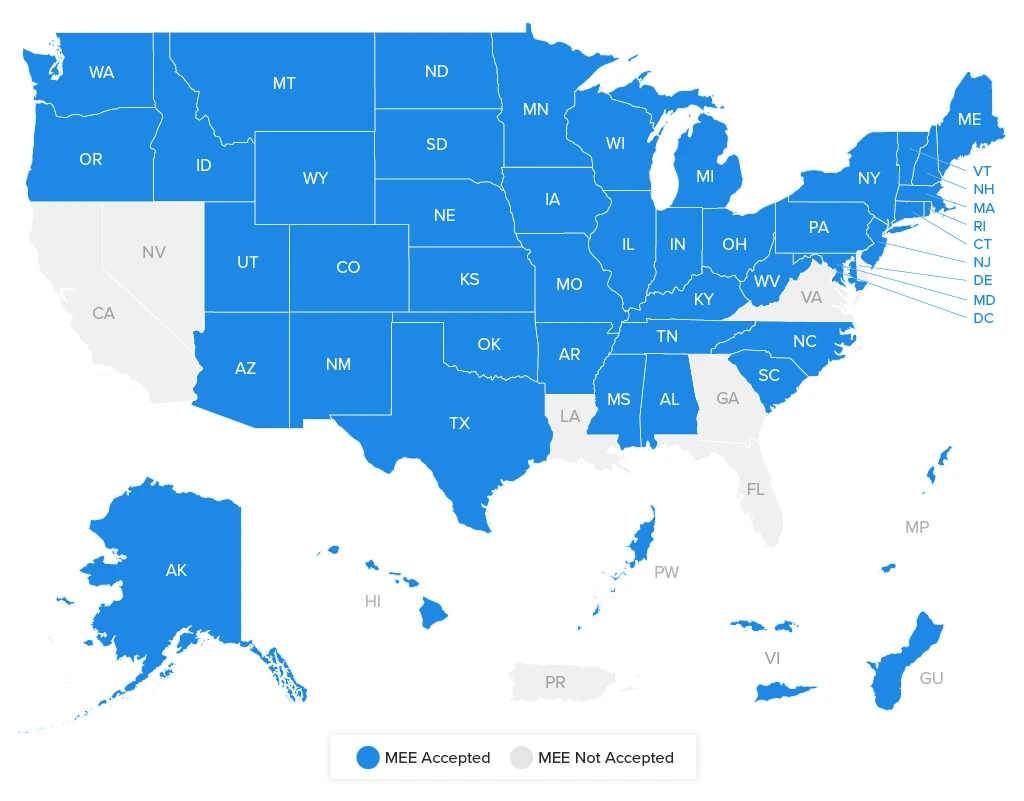About the MEE®
A Comprehensive Guide to the Multistate Essay Exam
Do you prefer comprehensive explanations that are grounded in sound reasoning? Then the Multistate Essay Exam (MEE®) is just the one for you! Part 1 of the Uniform Bar Examination (UBE®) is the written portion, where you'll attempt the MEE. While the Multistate Bar Exam (MBE®) is widely regarded as the UBE's most difficult portion, the MEE, too, is regarded as quite a challenging section, due to the vast array of topics it covers. There are six questions on the MEE, and you'll have 30 minutes to answer each. To find out more about the MEE, keep reading!
When and Who administers the MEE?
Developed by the National Conference of Bar Examiners (NCBE®), the MEE is administered just twice a year in February and July, on the Tuesday before the last Wednesday of the month. Typically weighed at 30% of the total score, each jurisdiction grades its MEE and determines how much weight this portion will be given to your overall score. The written part of the Bar is normally given on the first day of the exam.
What is MEE's purpose and importance?
The MEE is designed to assess the examinee's ability to: Identify the legal issue in a hypothetical fact pattern.
- Distinguish between relevant and irrelevant information.
- Offer an analysis of the issue in question with a clear, concise, and well-organized composition.
- Exhibit a solid understanding of fundamental legal concepts and principles.
The main difference between the MEE and the MBE is that the MEE requires examinees to exhibit excellent written communication skills.
Which jurisdictions accept the Multistate Essay Examination?
To determine the jurisdictions that accept the MEE, please refer to the table below:
| MEE Accepted Jurisdictions | Alabama, Alaska, Arizona, Arkansas, Colorado, Connecticut, District of Columbia, Hawaii, Idaho, Illinois, Indiana, Iowa, Kansas, Kentucky, Maine, Maryland, Massachusetts, Michigan, Minnesota, Mississippi, Missouri, Montana, Nebraska, New Hampshire, New Jersey, New Mexico, New York, North Carolina, North Dakota, Ohio, Oklahoma, Oregon, Pennsylvania, Rhode Island, South Carolina, South Dakota, Tennessee, Texas, Utah, Vermont, Washington, West Virginia, Wisconsin, Wyoming, Guam, Northern Mariana Islands, Palau, Virgin Islands |
| MEE Not Accepted Jurisdictions | California, Delaware, Florida, Georgia, Louisiana, Nevada, Virginia, Puerto Rico |
Is the MEE tested in non-UBE jurisdictions?
While most non-UBE jurisdictions administer a 'Drafted Exam' in place of the MEE, Northern Mariana Islands, Guam, Hawaii, Mississippi, South Dakota, Wisconsin, and Palau administer the MEE.

What is the MEE Exam Format?
The MEE consists of six essays. You have 30 minutes to complete each question, making the total duration of the exam to be three hours. The MEE is one of several factors that a board of bar examiners may use to determine your readiness to practice law. Each jurisdiction scores its MEE and adopts its own policy about the MEE's relative weight compared to other scores. The MEE accounts for 30% of your total bar exam score in UBE jurisdictions.
What subjects are tested on the MEE?
Here are the 12 subjects tested on the MEE:
- Business Associations (Agency and Partnership; Corporations and Limited Liability Companies)
- Civil Procedure
- Conflict of Laws
- Constitutional Law
- Contracts (including Article 2 [Sales] of the Uniform Commercial Code)
- Criminal Law and Procedure
- Evidence
- Family Law
- Real Property
- Torts
- Trusts and Estates (Decedents' Estates; Trusts and Future Interests)
- Article 9 (Secured Transactions) of the Uniform Commercial Code.
To learn more about the subtopics in each subject, read our MEE Subjects and Topics Outline.
How to register for the MEE?
To register for the MEE, you first have to register for the bar exam in your jurisdiction. As discussed above, the MEE is mandated in UBE jurisdictions and some non-UBE jurisdictions. Therefore, to register for the MEE, create a NCBE account and register for the bar exam in your jurisdiction.
MEE test accommodations
Some candidates may need to use special equipment or special testing accommodations to take the MEE if they have a "qualified disability" as defined by the Americans with Disabilities Act Amendments Act of 2008 (ADAAA). The regulating authority in the jurisdiction is responsible for making necessary adjustments. Examinees must apply for special accommodations within the jurisdiction in which they wish to take the MEE, and each jurisdiction has its application process and deadlines for requesting accommodations.
The MEE is written in Times New Roman (font size 12). The MEE is also printed in other formats, including Braille, large-print (18- and 24-point Helvetica type), audio, and a Microsoft Word document compatible with screen-reading software.
MEE Test Day Policies
Information on what—if anything—test-takers are permitted to carry into the testing facility, such as photo identification, will be made available by each jurisdiction separately.
Laptops are permitted for those who opt to take the MEE online, and examinees may use mechanical pencils, pens, and highlighters in some cases. Below is the list of all prohibited items, including, but not limited to:
- Cell phones
- Digital stopwatches
- Health monitors
- Headphones
- Interpreters and translators
- Cameras
- E-cigarettes
- Shotguns, rifles, or any other kind of weapon
- Printed materials (including books and notes)
- Paper of any kind, including scratch paper; rulers; bags; backpacks; food or beverages; ear plugs; Headgear; Other than Religious Headgear; (unless pre-authorized by the testing jurisdiction)
- If an examinee is caught possessing an illegal item, they most likely will be expelled from the bar exam, and their scores voided.
To learn more about MEE prohibitions in terms of materials and behavior, please read the NCBE’s MEE Test Day Policies.
How to study for the MEE?
We've put together a list of tips and tactics to follow to help you pass the essay portion of the Bar exam.
Focus on the highly tested subjects
Not all subjects are tested equally. For example, it would be unwise to devote as much time studying for Conflicts as Civil Procedure.
While predictions are just that–predictions, they are essential tools to use when trying to decipher where to focus your test prep time. So focus on the subjects tested most frequently in recent years, but don’t overlook any subject area.
-
Don't argue both sides
The MEE awards more points for applying the rule rather than arguing both sides. So, while you may want to state a majority rule and a minority rule, sometimes, in general, you should stick to applying the law and arriving at a conclusion.
-
Use "IRAC" for each issue
Use the IRAC method for issue spotting on the MEE. Some essay graders will stop grading your answer if your conclusion is wrong and won’t bother to read the rest of your answer.
For every issue that you spot, use the IRAC method:
- I: State the issue in a simplified manner
- R: State the rule (always state the general rule before discussing an exception or nuance.)
- A: Apply the law
- C: Write your conclusion
While it may seem boring to use IRAC, stating the issue first lets the grader know that you understand the facts of the case and that you've addressed each issue thoroughly.
-
Don't worry about creativity
Many law students pride themselves on their extraordinary writing skills, but the bar exam is not the time to display your talents as a legal scholar. Focus on writing efficiently and effectively, not eloquently.
-
Make answers visually easy for graders
Test graders' eyes can get tired after reading hundreds of exams, so make their lives easier by bolding or underlining keywords and phrases. Using paragraph breaks between the issue, rule, analysis, and conclusion will also make it easier for the grader to read your work and score your essay.
-
Time yourself
Practice timing yourself by answering practice questions within the 30 minute suggested window to allow for finishing all six questions.
-
Make an educated guess if you must
If you get stumped on a question, chances are you're not alone. There have been times that the test has included questions that no one expected, so instead of skipping the question, do your best and answer it anyway, even if that means you have to make an educated guess.
-
Practice, practice, practice!
There's no such thing as practicing too much, so allot time in your schedule to practice. This is the test that could determine the rest of your life.

FAQs
How many times can you re-take the MEE?
The number of times you can retake the bar exam depends on the jurisdiction. In most jurisdictions, the number of attempts varies between two to six times.
Can you fail the MEE and still pass the bar exam?
The MEE accounts for 30% of your total score in UBE jurisdictions.The minimum score requirement for the MEE varies from jurisdiction to jurisdiction, but is commonly around 30% in non-UBE jurisdictions, too. You can fail the MEE and still pass the bar because you just need a cumulative score of 65% to 70% to pass the overall bar exam.
How many MEE questions should I practice?
There are 30 minutes allotted to each MEE question. When studying for the bar, aim to do as many practice MEEs as you can to expose yourself to different question types and nuances of the law. Your bar review course will generally assign 1-2 practice essays per day, and you should plan on working through at least 8 practice essays per week. The good news is that the Themis Bar Review program provides you with unlimited graded essays at no additional cost. Be sure to utilize the graded essay function of your bar review course, as your essay grader will point out strengths and weaknesses in your writing that will help you progress more quickly through the learning process.
Will I fail the bar exam if I write short MEE answers?
Not necessarily. The MEE requires detailed answers based on sound reasoning. Being too “wordy” will not earn you any “bonus” points. When in doubt, always choose quality over quantity.
Do I need to apply state law to answer MEE Questions?
If you are taking the UBE, it is not necessary to apply state law to MEE questions. For example, if you are taking the New York Bar Exam, you will apply general principles of law, also known as “majority law.” You do not need to apply state-specific law.
How long should MEE essays be?
While there is no perfect length, the best-scoring essays are often one page long. To properly compose an issue statement, rule paragraph, analysis, and conclusion, this essay length is sufficient.
Read More about the Bar Exam
What does it take to pass the bar exam? Which course-preps to are you referring to? Find out what you need to know to become the next attorney in your state!
